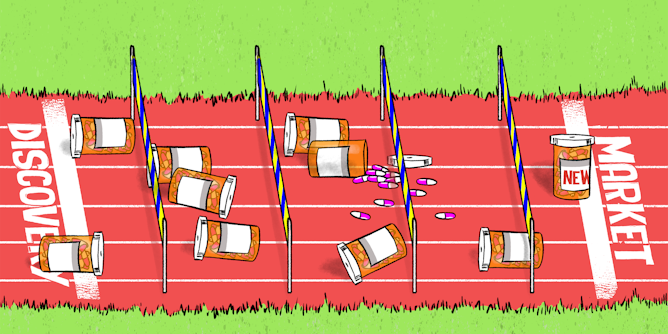| |
|
|
|
|
|
|
| |
|
Editor's note
|
|
Whether you’re someone who takes the odd ibuprofen for an occasional headache, or you have a chronic condition requiring regular medication, you can be reasonably confident the drug you’re using will benefit the condition it’s intended for. And it will be safe, if taken as instructed. You can be confident of this because it took years of animal and human studies to prove both the medication’s safety and effectiveness.
Today, we explain the four phases of human trials a drug has to go through before it gets to market, and how the gold standard of drug testing - the randomised controlled trial - actually works. And we have a handy animation to make the concepts easier to digest.
|
Sasha Petrova
Deputy Editor, Health + Medicine
|

|
|
Top story
|

A drug needs to pass quite a few hurdles before it gets to the market.
The Conversation/Wes Mountain
Sabine Braat, University of Melbourne; Elaine Mary Pascoe, The University of Queensland; Katherine J Lee, Murdoch Childrens Research Institute; Laurent Billot, UNSW
Only around 10% of new drugs in development make it onto the market. A drug needs to go through animal trials, and then four phases of human trials to be deemed suitable for use in patients.
|
Health + Medicine
|
-
Katherine J Lee, Murdoch Childrens Research Institute; Elaine Mary Pascoe, The University of Queensland; Laurent Billot, UNSW; Sabine Braat, University of Melbourne
A randomised controlled trial is the best way to compare a new treatment with the standard treatment. And randomising trial participants is a core feature of the experiment.
-
Rachael Sharman, University of the Sunshine Coast
If a child is old enough to ask about suicide, then they're probably old enough for a discussion about it.
|
|
Politics + Society
|
-
Suzanna Fay-Ramirez, The University of Queensland; Emma Belgrove, The University of Queensland
Gun control in Australia is not a black-and-white issue, and it's time we had a public debate that reflected that fact.
-
Michelle Grattan, University of Canberra
The ABS, in its update on Tuesday, said it estimated it had now received 10 million ballots.
-
Susan Gair, James Cook University; Ines Zuchowski, James Cook University
New research shows that, too often, grandparents who are primary carers are being locked out of decisions about their grandchildren's welfare.
|
|
Arts + Culture
|
-
Liz Conor, La Trobe University
Beauty brand Dove caused controversy with an ad seemingly showing a black woman turning white after using its body lotion. While Dove removed the ad, it played into the racist history of skin whitening.
-
William Peterson, Flinders University
British dancer Aakash Odedra performed four solo works, drawing on classical Indian dance, in a fitting close to the OzAsia festival.
|
|
Science + Technology
|
-
Kevin Orrman-Rossiter, University of Melbourne
The students of class 3E, Ferny Grove State School, want to know if astronauts get space sick when travelling to the International Space Station.
-
Ken Anthony, Australian Institute of Marine Science; Britta Schaffelke, Australian Institute of Marine Science; Line K Bay, Australian Institute of Marine Science; Madeleine van Oppen, Australian Institute of Marine Science
Corals on the Great Barrier Reef that are tolerant to warmer waters can be used to help repair other parts of the reef damaged by recent coral bleaching events.
|
|
Environment + Energy
|
-
Heather Keith, Australian National University; David Lindenmayer, Australian National University; Michael Vardon, Australian National University
How do you determine the financial benefit of cutting a tree down, versus leaving it standing? Environmental accounting offers some insight.
-
Tony Wood, Grattan Institute
Talk of the government preparing to 'walk away' from the Clean Energy Target proposal is unnecessarily cynical.
|
|
Cities
|
-
Steven Rowley, Curtin University; Peter Phibbs, University of Sydney
The states that are delivering more affordable housing have sophisticated, multi-pronged strategies to serve the full range of needs.
|
|
Business + Economy
|
-
Dan Jerker B. Svantesson
Do you know where your beer was brewed?
Many "imported beers" are actually made locally. Should we have clearer labelling for the origins of beer?
-
John Quiggin, The University of Queensland
A Senate committee has made the right decision by rejecting the Fair Work Commissions recommendations to slash penalty rates - here's why.
|
|
Columnists
|
|
|
| |
Featured jobs
|

|
University of Melbourne — Southbank, Victoria
|

|
Monash University — Bendigo, Victoria
|

|
RMIT University — Melbourne, Victoria
|

|
The Conversation AU — Melbourne, Victoria
|
|
|
|
| |
| |
| |

|
| |
| |
| |
Featured events
|

|
The Science Exchange, 55 Exchange Place, Adelaide, South Australia, 5000, Australia — Australia New Zealand School of Government
|

|
TBC, Sydney, New South Wales, 2000, Australia — Australia New Zealand School of Government
|
|
|
Deakin Downtown, Tower Two, Level 12/727 Collins Street, Docklands, VIC 3008, Melbourne, Victoria, 3008, Australia — Melbourne Women's Fund
|

|
221 Burwood Highway, Burwood, Victoria, 3125, Australia — Deakin University
|
|
|
|
| |
| |
| |
| |
| |
|
|
|
|
|
|
|
|